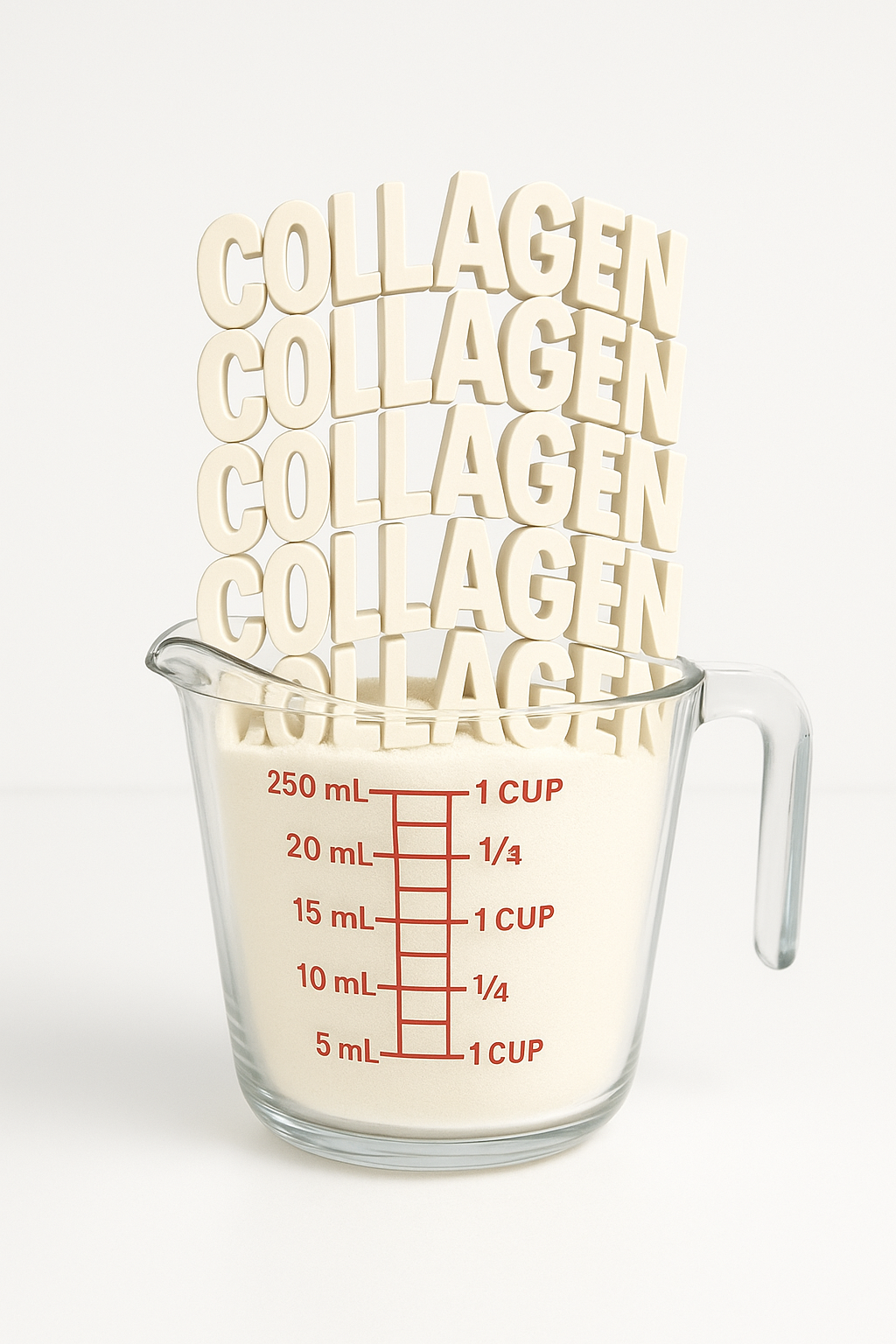How to Maximize Collagen Production in Your Skin for a Youthful, Healthy Glow

Collagen: The Foundation of Youthful Skin
Collagen is the most abundant protein in your body and a critical structural component of the skin. It acts like scaffolding, keeping skin firm, smooth, and resilient. Unfortunately, collagen production naturally declines by about 1% per year starting in your mid-20s, and the breakdown process accelerates with sun exposure, poor nutrition, stress, and environmental toxins.
The result? Fine lines, wrinkles, sagging, and loss of skin elasticity.
The good news: with the right lifestyle strategies, targeted nutrition, and advanced treatments, you can stimulate your skin’s collagen production at any age.
Understanding How Collagen Is Made
Collagen is produced by specialized skin cells called fibroblasts. They assemble collagen fibers from amino acids, vitamin C, minerals, and other co-factors. Anything that damages fibroblasts or reduces these building blocks will impair collagen synthesis.
Key factors that influence collagen production:
- Age – Fibroblasts slow down with time.
- Hormones – Declining estrogen and testosterone levels reduce collagen density.
- Nutrition – Deficiencies in protein, vitamin C, zinc, copper, and silica limit collagen formation.
- Inflammation – Chronic inflammation degrades existing collagen.
- UV exposure – Ultraviolet light breaks down collagen fibers and damages fibroblasts.
Step 1: Nutrition for Collagen Support
Your skin can’t make collagen without the right raw materials. A diet rich in protein and micronutrients is essential.
Protein and Amino Acids
Collagen is made from amino acids — especially glycine, proline, and lysine.
- Sources: chicken, fish, eggs, lean beef, legumes, and collagen peptides.
Vitamin C
An essential co-factor for collagen synthesis and a powerful antioxidant.
- Sources: citrus, berries, kiwi, bell peppers, and leafy greens.
Zinc and Copper
Required for cross-linking collagen fibers and maintaining skin strength.
- Zinc sources: oysters, pumpkin seeds, beef, lentils.
- Copper sources: nuts, seeds, shellfish, dark chocolate.
Silica
Helps strengthen connective tissue and improve skin elasticity.
- Sources: cucumbers, oats, asparagus, and mineral-rich water.
Antioxidants
Reduce oxidative damage to collagen fibers.
- Sources: colorful fruits and vegetables, green tea, dark chocolate.
Step 2: Protect Collagen from Damage
Stimulating collagen is only half the battle — you also need to prevent its breakdown.
Sun Protection
UV light is the fastest way to destroy collagen. Daily sunscreen use — even on cloudy days — is non-negotiable. Choose a broad-spectrum SPF 30+ mineral sunscreen with zinc oxide or titanium dioxide.
Reduce Sugar and Processed Foods
High sugar intake leads to glycation, a process that stiffens collagen fibers and reduces elasticity.
Avoid Smoking
Nicotine and other chemicals in cigarettes constrict blood vessels and accelerate collagen breakdown.
Manage Stress
Chronic cortisol elevation impairs collagen synthesis. Stress management techniques (see our blog on Stress Management Techniques) protect skin and overall health.
Step 3: Lifestyle Habits That Boost Collagen
Strength Training
Exercise improves circulation, delivering more nutrients and oxygen to skin cells, which supports collagen production.
Adequate Sleep
Collagen synthesis is highest during deep sleep stages. Aim for 7–9 hours nightly.
Hydration
Water keeps skin cells plump, supports nutrient delivery, and optimizes enzymatic reactions involved in collagen formation.
Step 4: Advanced Treatments to Stimulate Collagen
At Sheen Vein (Aesthetics and Functional Medicine) in St. Louis, we offer several clinically proven treatments to boost collagen production:
1. Fotona4D® Laser Skin Tightening
A non-invasive laser treatment that stimulates collagen at multiple skin depths, improving firmness, elasticity, and overall skin texture.
2. Microneedling with PRF (Platelet-Rich Fibrin)
Microneedling creates micro-injuries that trigger fibroblast activity. When combined with PRF — rich in growth factors — the skin’s repair process is supercharged, producing new collagen and elastin.
3. Red Light Therapy (Photobiomodulation)
Red and near-infrared light stimulate mitochondrial energy production, which boosts fibroblast activity and collagen synthesis.
4. Radiofrequency Skin Tightening
Uses controlled heat to contract existing collagen fibers and stimulate new collagen production for long-lasting firmness.
5. Injectable Collagen Stimulators
Certain injectables, like poly-L-lactic acid (Sculptra®), gradually stimulate the skin’s own collagen production for natural volume restoration.
Step 5: Internal Support with Functional Medicine
A healthy body produces healthier skin. In functional medicine, we address internal factors that can impair collagen production:
- Hormone Balance – Optimizing estrogen, progesterone, and testosterone levels can slow collagen loss during aging.
- Gut Health – Poor digestion or gut dysbiosis can reduce nutrient absorption (see our blog on Fixing Gut Dysbiosis to Help Autoimmune Issues).
- Nutrient Deficiencies – We use advanced testing to identify and correct deficiencies that limit collagen synthesis.
- Inflammation Control – Managing autoimmune activity, food sensitivities, and chronic inflammatory triggers helps protect skin structure.
A Real-Life Example
One of our patients, a 52-year-old woman, came to us concerned about sagging skin and deepening lines. We combined an anti-inflammatory diet rich in collagen-building nutrients, weekly red light therapy, and a series of PRF microneedling treatments.
After 4 months, she noticed:
- Improved skin firmness and elasticity
- Softer fine lines
- A more radiant complexion
Importantly, she also felt healthier overall — with better energy and fewer inflammatory symptoms — because we addressed her skin from the inside out.
The Takeaway
Collagen production naturally declines with age, but you can slow that loss — and even reverse some of it — with a strategic, multi-layered approach. By combining nutrient-rich eating, protective lifestyle habits, and advanced aesthetic treatments, you can enjoy firmer, healthier, more youthful-looking skin.
At Sheen Vein (Aesthetics and Functional Medicine), we help patients in St. Louis and beyond create customized skin health plans that address both internal and external collagen support.
Bottom Line: You can’t stop time, but you can work with your body to maximize collagen production and keep your skin strong, smooth, and vibrant at any age.
Internal Link Opportunities:
- Link “Stress Management Techniques” to that specific blog.
- Link “gut dysbiosis” to Fixing Gut Dysbiosis to Help Autoimmune Issues.
- Link “red light therapy” to How a Red Light Therapy Bed with PEMF May Help Long COVID.